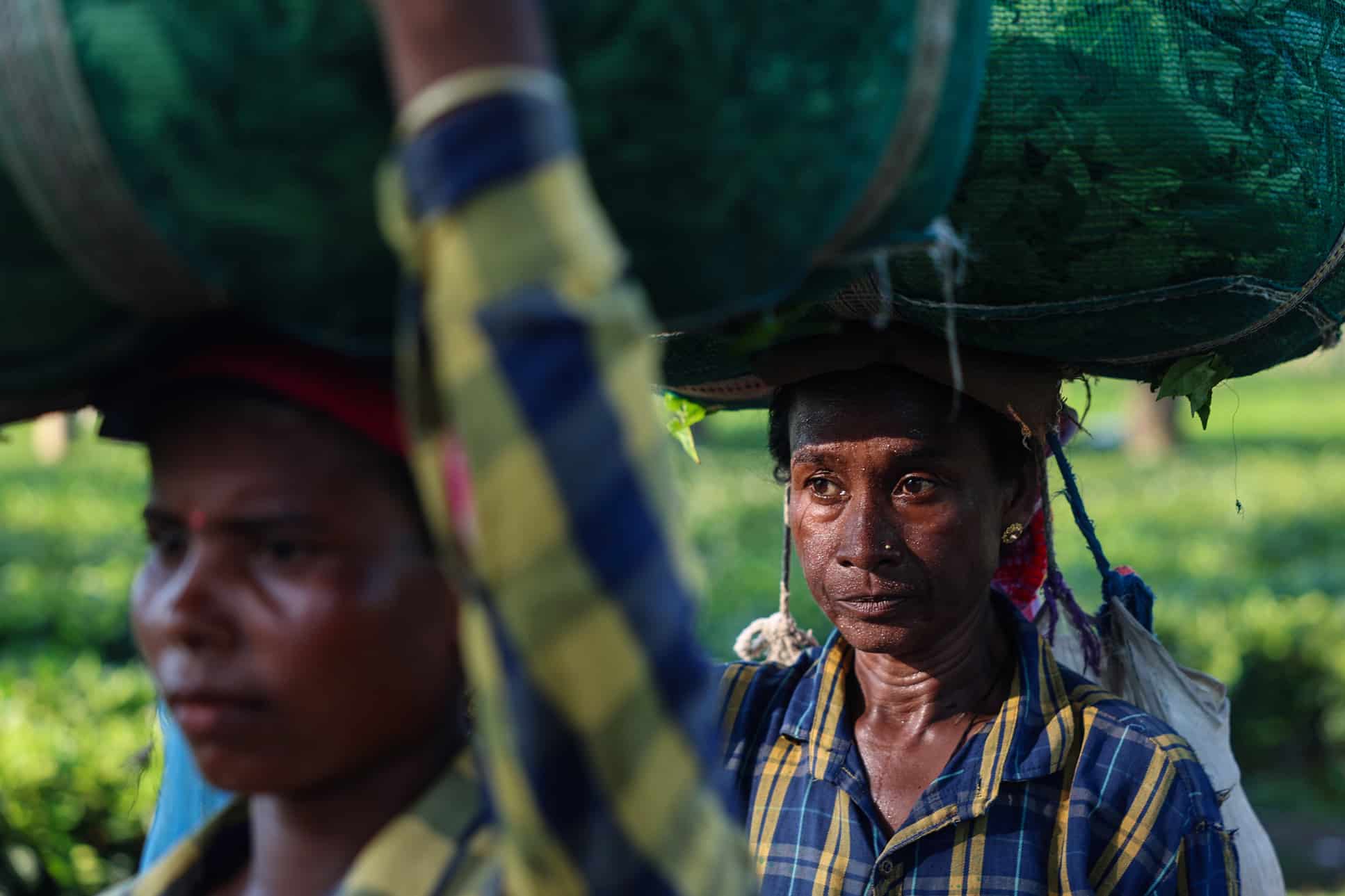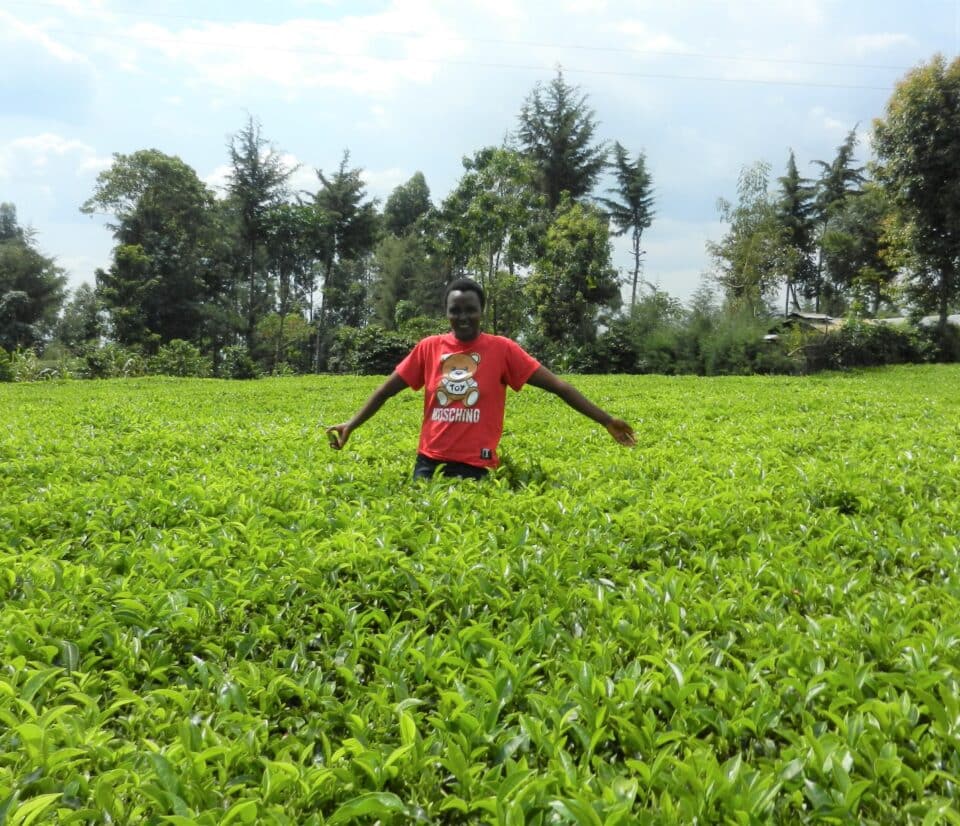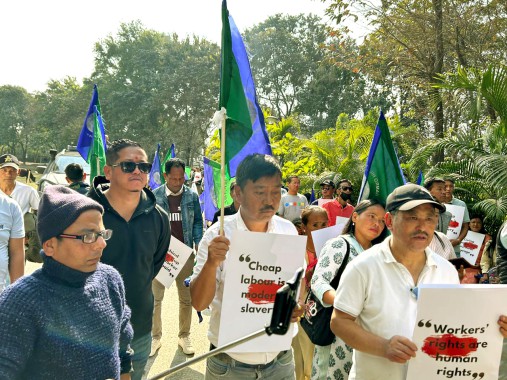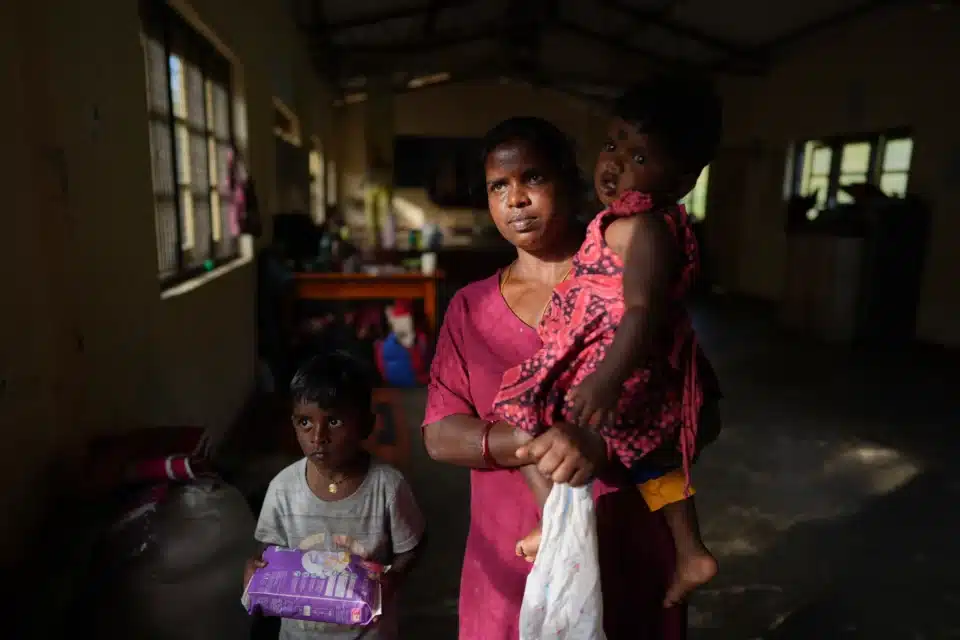The Headlines
The pressures of climate change, falling prices and inequality continue to test the strength of those who grow and make the tea we drink. This month’s heavy rains in the Darjeeling hills triggered multiple landslides, claiming at least 18 lives and cutting off entire villages. Similar patterns of adverse weather are being reported from Assam to Kenya where changing rainfall, drought and rising temperatures threaten both lives and livelihoods.
Economic pressures are also mounting. Plantation closures and price collapses have left thousands of workers without income while disputes over bonuses and wages continue across several Indian tea estates.
There are worrying signs that these pressures could be creating the conditions for violence as disaffected workers vent their anger on managers after months of not being paid or bonus payments being reduced or delayed. For now, actions are confined to ‘gheraoing’ (preventing managers from leaving their office) or forcing them to get out of their car and walk home. But if allowed to escalate, the situation could have lethal consequences as has, tragically, happened in the past. Managers are caught between workers’ urgent need for payment and the market and climate pressures their plantations are experiencing. The long term answer is to break this cycle of low prices and low pay; to ensure that workers have greater agency, dignity and voice, and that plantation managers have sufficient resources to pay living wages.
But there were also some signs of solidarity and progress towards a fairer, more resilient tea industry this month such as Kenyan court rulings upholding workers’ rights to renewed dialogue between unions and management in parts of India and East Africa. In India, innovation and inclusion are quietly reshaping the sector. From Nagaland’s community-led tea enterprise empowering women’s groups, to Tripura’s landmark decision to grant land ownership to tea plantation families, to Kenya’s new export and packaging reforms helping farmers earn more at source, progress is being made in creating more secure and sustainable futures for all who rely on tea for their livelihoods.
Tensions rise as tea workers’ push for fair pay and bonuses
Across Asia and East Africa, tea workers continue to face long-standing struggles over wages and bonuses, highlighting systemic inequalities in the sector. In India, the annual Durga Puja bonus has become a flashpoint. While estates such as Hollonghabi, Majherdabriand over 60 others in north Bengal have paid the state-advised 20% bonus, disputes persist in multiple plantations where managements offered lower or staggered payments, prompting protests, “gheraos,” and in some cases temporary closures (The Hindu, 07/09/2025; Telegraph India, 20/09/2025).
In the Nagaisuri and Chinchula tea estates, tensions rose as workers protested for their full festival bonuses, drawing a police presence after talks between management and workers broke down. Most workers later agreed to a revised bonus offer and the demonstrations ended without violence, despite conflicting reports about a police lathi charge (The Hindu, 29/09/2025; Telegraph India, 28/09/2025; Millennium Post, 28/09/2025).
In Assam, unions successfully secured the maximum 20% bonus across 90 estates, marking a key victory for workers’ advocacy (Times of India, 05/09/2025). Kerala also saw settlements on pending salaries following lockouts in the POABS group (The Hindu, 06/09/2025).
Elsewhere, Kenya and Tanzania have witnessed positive developments as companies like DL Tea begin clearing long-overdue debts and social security contributions, providing a vital lifeline to farmers and workers (Billionaires Africa, 07/09/2025).
Despite these gains, Sri Lankan and Bangladeshi plantation workers remain under severe strain. In Sri Lanka, proposals to raise wages remain unfulfilled, leaving many female-headed households struggling with hunger and malnutrition (Groundviews, 22/09/2025). In Bangladesh, state-owned NTC has failed to pay nearly four months’ wages while increasing directors’ fees, highlighting deep governance issues (The Business Standard, 03/09/2025). Nutritional surveys show tea workers consistently underweight with limited access to protein, vegetables or healthcare, demonstrating how low wages directly affect health and wellbeing (Daily Star, 20/09/2025).
A wage dispute at the Lower Fagu Tea Garden in India’s Kalimpong has led to a full suspension of operations after protests escalated on 18 September. The plantation’s manager was reportedly confined for several hours during a “gherao,” with management later citing safety concerns and a breakdown in order as reasons for withdrawal. The long history of wage disputes, including violent confrontations over unpaid salaries, underscores the urgent need for fair wages and stronger dialogue between workers and estate owners (Kalimpong News, 21/09/2025; IOL, 23/11/2014).
Closures, falling prices and calls for fairness
Stories of hardship and resilience continue to mount in tea-growing regions. In Kenya, the family-run Njeru Industries Limited was placed under administration on 3 September, exposing growing financial strain in the country’s $1.3 billion tea sector as falling auction prices, rising costs and delayed export payments squeeze liquidity (Billionaires Africa, 08/09/2025). In India, the closure of three tea plantations in the Dooars left more than 2,000 workers without income (Telegraph India, 13/09/2025), while prolonged lockouts in Darjeeling have driven families into severe distress, prompting local authorities to push for faster support under the FAWLOI scheme (Millennium Post, 11/09/2025). A brief reprieve came in Kerala, where Haileyburia Tea Estates reopened after management reached an agreement with unions on pay and benefits (The Hindu, 01/09/2025).
Meanwhile, small tea growers across Assam, Bengal and South India are protesting against a dramatic collapse in green leaf prices, in some cases from Rs 52 to as little as Rs 14 per kilo, far below production costs (Times of India, 12/09/2025; Outlook Business, 01/09/2025). Growers are demanding fair pricing, an end to exploitative practices and recognition as agricultural farmers to access welfare schemes. Calls for a National Tea Sustainability Mission and better market protections underscore a deepening crisis in the smallholder sector (Millennium Post, 05/09/2025).
Amid these economic pressures, a Kenyan court ruling has offered a measure of justice. A British-owned multinational was found to have unlawfully dismissed a worker on medical grounds, a decision the judge said amounted to discrimination. The landmark judgment is being hailed as a precedent for stronger worker protections and a reminder that profitability cannot come at the cost of human dignity (Uzalendo News, 02/09/2025).
Climate pressures continue to hit tea landscapes hard
The effects of a changing climate are being felt across the world’s tea landscapes. Across South and East Asia, the climate emergency is hitting tea workers and farmers hard. In Assam, rising temperatures are reducing daily harvests and endangering pluckers’ health with heat exhaustion becoming commonplace (Reuters, 29/08/2025). In South India, planters warn of declining yields, erratic rainfall and surging pest outbreaks. Experts at the United Planters’ Association of Southern India convention urged innovation and adaptation to safeguard both livelihoods and consumer demand in a rapidly changing market (The Hindu, 19/09/2025).
The physical toll of extreme weather is becoming more visible each season. In West Bengal, disaster struck when continuous heavy rain caused floodwaters from Bhutan to breach an embankment, inundating the Jiti Tea Garden. Thirty-two workers were rescued in a night-time operation after their quarters were submerged (Millennium Post, 06/09/2025). Just weeks later, on Sunday 5 October, in Darjeeling, fresh landslides tore through tea estates in the Mirik–Sukhiapokhri area. At least 18 people were killed with fears that the number could rise further. Homes, tea plantations and roads were destroyed, cutting off several remote hill communities (Times of India, 05/10/2025). The full extent of the situation is still being assessed but early reports describe entire sections of hillside collapsing under saturated soil, a stark reminder of how exposed mountain tea regions have become.
Further west, on Nancy Githaiga’s Fairtrade-certified farm in Kenya, erratic rain patterns and unseasonal cold have slowed growth, caused droughts and triggered destructive landslides. “If things continue the way they are,” she said, “the very existence of tea farming in this area will be threatened” (The Independent, 22/09/2025).
Resilience, innovation and empowerment in tea communities
Alongside these hardships across the tea-growing industry, quiet but significant changes are taking place in how tea is made, how value is shared and how communities are shaping their own futures.
In Nagaland, India, ATOQA’s locally driven model is proving that small-scale tea production can be both sustainable and socially transformative. Working with 155 growers across 12 villages, the enterprise has anchored its growth in community participation and environmental care, helping women’s Self-Help Groups gain financial independence and new livelihoods with plans to expand into national and international markets while keeping production eco-friendly and locally rooted (Nagaland Tribune, 20/09/2025).
In Kenya and northeastern India, new approaches aim to help farmers capture more value at source. Kenya’s decision to remove taxes on packaging materials intends to make it easier for exporters to package tea domestically, improving traceability, freshness and farmer income (KBC, 06/09/2025; Capital FM, 08/09/2025). The shift towards premium markets gained momentum in September when Kenya’s first consignment of orthodox teas sold at the Mombasa auction for more than double the price of traditional CTC teas (The Star, 24/09/2025). In Assam, smallholder tea farmers are learning handmade tea techniques that offer higher margins than conventional leaf sales (Sentinel Assam, 04/09/2025). In Vietnam’s, Hao Dat Tea Cooperative has shown how new fermentation technology can cut costs and triple output while maintaining quality (Vietnam vn, 23/09/2025).
Support systems for tea communities are also growing stronger. From Assam’s digital inclusion initiatives, which are connecting plantation workers to e-banking and government services (ICT Works, 05/09/2025) to Wufeng’s collective farming support teams in China that assist elderly growers (Xinhua, 09/09/2025) and Kenya’s MUSULLI Project, training over 50,000 farmers in agribusiness and rights awareness (Kilimo News, 10/09/2025).
In Tripura, northeastern India, the state government has granted land ownership to 4,500 worker households, aiming to allow them to live without fear of eviction and to invest in their futures. Wages have also been raised from Rs 176 to Rs 204 for adult workers, a move officials say has improved living standards across 56 active tea plantations (Times of India, 18/09/2025).
This News Update was written by Sarah Amankwah
Share this update
Sign up for our monthly newsletter to stay in the know about human rights in the tea sector
Each issue of our newsletter includes:
A summary of the latest tea sector news
Upcoming THIRST events
THIRST news and updates
New reports and resources from our Knowledge Hub




